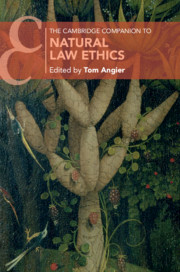Book contents
- The Cambridge Companion to Natural Law Ethics
- Other Volumes in the Series of Cambridge Companions
- The Cambridge Companion to Natural Law Ethics
- Copyright page
- Contents
- Contributors
- Introduction
- Part I The History of Natural Law Ethics
- Part II The Revival of Natural Law Ethics
- Part III Natural Law Ethics and Religion
- Part IV Applied Natural Law Ethics
- Part V Natural Law Ethics
- 13 Challenges Facing Natural Law Ethics
- 14 Natural Law Ethics and the Revival of Aristotelian Metaphysics
- 15 Prospects for Natural Law Ethics in the Twenty-First Century
- References
- Index
- Other Volumes in the Series of Cambridge Companions (continued from page ii)
14 - Natural Law Ethics and the Revival of Aristotelian Metaphysics
from Part V - Natural Law Ethics
Published online by Cambridge University Press: 21 October 2019
- The Cambridge Companion to Natural Law Ethics
- Other Volumes in the Series of Cambridge Companions
- The Cambridge Companion to Natural Law Ethics
- Copyright page
- Contents
- Contributors
- Introduction
- Part I The History of Natural Law Ethics
- Part II The Revival of Natural Law Ethics
- Part III Natural Law Ethics and Religion
- Part IV Applied Natural Law Ethics
- Part V Natural Law Ethics
- 13 Challenges Facing Natural Law Ethics
- 14 Natural Law Ethics and the Revival of Aristotelian Metaphysics
- 15 Prospects for Natural Law Ethics in the Twenty-First Century
- References
- Index
- Other Volumes in the Series of Cambridge Companions (continued from page ii)
Summary
The natural law conception of ethics is more closely associated with Thomas Aquinas than with any other thinker, and Aquinas’ position is famously grounded in a metaphysics of Aristotelian essentialism and teleology. It is often claimed that this metaphysics was decisively undermined by the scientific revolution. Hence it might appear that modern science has refuted what has been, historically, the main approach to understanding natural law.
Alternative versions of natural law may seem to sidestep this difficulty by looking for foundations in something other than an essentialist and teleological conception of nature. For example, Locke’s theory of natural law is grounded in the thesis of divine ownership of human beings. Violating the rights to life, liberty and property that we have under natural law is, for Locke, essentially a matter of damaging God’s property.
- Type
- Chapter
- Information
- The Cambridge Companion to Natural Law Ethics , pp. 276 - 296Publisher: Cambridge University PressPrint publication year: 2019
- 1
- Cited by

